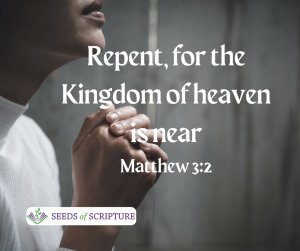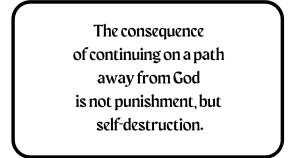Repentance: An Invitation to Return Home
Topics to Dig Into
 He frightened me. I imagined a half beast-half man creature covered in camel hair, feasting on honey glazed bugs and shouting “Repent, you hypocrites!” I cowered in fear and associated repentance with this angry image.
He frightened me. I imagined a half beast-half man creature covered in camel hair, feasting on honey glazed bugs and shouting “Repent, you hypocrites!” I cowered in fear and associated repentance with this angry image.
It was John the Baptist’s style of preparing the way for the Lord.
“Repent, for the kingdom of heaven has come near”…. Now John wore clothing of camel’s hair with a leather belt around his waist, and his food was locusts and wild honey. Then the people of Jerusalem and all Judea… were baptized by him in the river Jordan, confessing their sins. But when he saw many Pharisees and Sadducees coming for baptism, he said to them, “You brood of vipers! Who warned you to flee from the wrath to come? Bear fruit worthy of repentance… Even now the ax is lying at the root of the trees; every tree therefore that does not bear good fruit is cut down and thrown into the fire.
Matthew 3:2,4-8,10 (NRSV)
My childhood ears heard “Repent or else!” And my mind finished the sentence “or else go to hell” (unspoken because hell is a bad word). Motivated by fear, I tried my best to obey the rules in order to avoid being thrown into the fire.
This impression still colors my relationship with repentance. Years of Bible study have taught me the official definition: to change one’s mind, think better, turn back, or learn one’s lesson.
 The Hebrew New Year’s tradition paints a beautiful image of repentance as an invitation from God to return home.
The Hebrew New Year’s tradition paints a beautiful image of repentance as an invitation from God to return home.
A ram’s horn, or shofar, is blown 100 times on Rosh Hashanah, the Jewish New Year. The sound can’t be ignored and calls Jews to wake up from their comfortable, worldly, apathetic slumber in sin. It initiates ten days of repentance, also called Ten Days of Awe, which lead up to the Day of Atonement, Yom Kippur (I’ll write about Yom Kippur in the next post).
Jews and Christians alike are invited to wake up, to begin anew by turning to the source of life. Repentance beckons us away from a culture that assigns our worth according to our beauty and our ability to produce. We redirect ourselves toward God and rediscover who we already are. Return to the One who created you and loves you, the One who calls you very good (Gen 1:31), the apple of His eye (Dt 32:10), a bride beautifully dressed for her husband (Rev 21:2), a people close to His heart (Ps 148:14).
Repentance invites us to remember who we already are.
Repent, then, and turn to God, so that your sins may be wiped out, that times of refreshing may come from the Lord.
Acts 3:19 (emphasis mine)
On January 1st we often make New Year’s resolutions and work toward becoming a better version of ourselves. Rosh Hashanah also offers the opportunity for new beginnings. But instead of resolving to improve, we reclaim our identity as God defines it. Aaron Shaw at The Bible Project writes:
Rosh Hashanah says that we are already built to be loved by God and remain safe in his presence. Instead of asking us to please God (or others) by becoming more than we are, Jesus invites us to see who we already are. It’s a different story, one that scraps the notion of “human resources” or “human failures” by embracing the original truth of creation: Humans are miraculous creations of God, made for life and love with him and each other in this generous, flourishing, and good creation.
Remorse accompanies repentance.
Biblical characters expressed remorse outwardly in community.
While Ezra was praying and confessing, weeping and throwing himself down before the house of God, a large crowd of Israelites – men, women and children – gathered around him. They too wept bitterly.
Ezra 10:1
Remorse, yes. Regret, of course, because we’ve wasted time being less than fully alive. But repentance doesn’t ask us to wallow in shame over our past mistakes. We confess, express remorse and move toward our life-giving God. I
 While fear no longer motivates my repentance, some fear is justified. Throughout the Bible, the unrepentant face doom. Jesus warns of judgment on the unrepentant cities of Korazin, Bethsaida and Capernaum (Matt 11:20-24). He pronounces “Woe to you, teachers of the law and the Pharisees, you hypocrites!” lamenting that He longed for them to repent so He could “gather [His] children together, as a hen gathers her chicks under her wings, but [they] were not willing.” (Matt 23:1-39)
While fear no longer motivates my repentance, some fear is justified. Throughout the Bible, the unrepentant face doom. Jesus warns of judgment on the unrepentant cities of Korazin, Bethsaida and Capernaum (Matt 11:20-24). He pronounces “Woe to you, teachers of the law and the Pharisees, you hypocrites!” lamenting that He longed for them to repent so He could “gather [His] children together, as a hen gathers her chicks under her wings, but [they] were not willing.” (Matt 23:1-39)
The consequence of unrepentance is self-destruction.
Instead of fear, we can be motivated by awe for our Creator who gives life and defines what it means to be fully human. Repentance invites us to embrace His truth about us and to live every day as if it were true.
Receive God’s invitation
Remember who you already are
Return home
Read about John’s fiery fervor for real change because it isn’t about being sorry, but being changed.
#SeedsofScripture #scripturestudy #RoshHashanah #TheBibleProject #fullyhuman #daysofawe #repentance
Resources:
Rabbi Jason Sobel on TBN’s God’s Appointed Times
https://bibleproject.com/articles/rosh-hashanah

Amen. For me, I define it as a “turning away from the sin(s) I have been forgiven of.” In my mind, if I don’t endeavor to turn from my sin, then I am (in a sense) embracing it. Sin can become an idol in that we desire it more than we desire God. I call them “little “g” gods”, and I think we all have them. Should we? Of course not, but the fact that we do means that when I apply Romans 8:28 to my life, then God is using those “little “g” gods” in my life to purify and help me grow closer to Him. Great post my friend.
Yes, we turn away from sin which is itself a reward. But better yet is the God we find in the other direction and the life He prepared for us! And while He didn’t desire those little gods for us, He’ll use those experiences for the good of His Kingdom. Thanks for engaging with my posts so faithfully.
“Repentance doesn’t ask us to wallow in shame over our past mistakes. We confess, express remorse, and move toward our life-giving God.” Great quote and so true! Moving on, growing, and maturing in Him is what Jesus wants.
But, I, too, was one who was motivated by fear as a teen. Thankfully, the Lord sent someone to teach me the Love of Jesus.
I think it was the era Stephanie. They never mentioned the love of God or Jesus. The fear did so much harm. I hope the global church has put that behind us to focus on the incredible love of our Messiah.
Great post Cathy! I too had that youthful fear driven obedience and blatant misunderstanding of Grace and what Christ’s death on the cross means in real time. I agree that repentance never stops there. It’s our means for growth. Love the incorporation of Jewish practice. 💗
I love that I say it’s our means for growth. Repentance is the beginning. That’s when the Spirit can start His work.